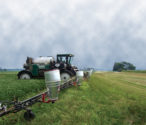Advertise Follow Us
Items Tagged with 'residue decomposition'
ARTICLES
Turn Stubborn Piles of Residue Into Cash for No-Till Soils, Crops
Biological residue digesters on the market can help no-tillers saddled with not-so-perfect soil biology recycle their crop stover and stubble faster to improve nutrient management.
Read More
From the Desk of Laura Barrera
Keys to Speeding Up Residue Decomposition
While residue decomposition is largely controlled by the environment and soil conditions, there are some things no-tillers can do to help speed breakdown along.
Read More
Bio Strip-Till: Best of Both Worlds
Using cover crops with strip-tillage helps growers improve the crop-row environment, build soil organic matter and protect fields from erosion.
Read More
Should You Go With a No-Till Air Seeder Or a No-Till Drill?
Residue levels and other no-till cropping concerns need to be considered before making a
Read More









